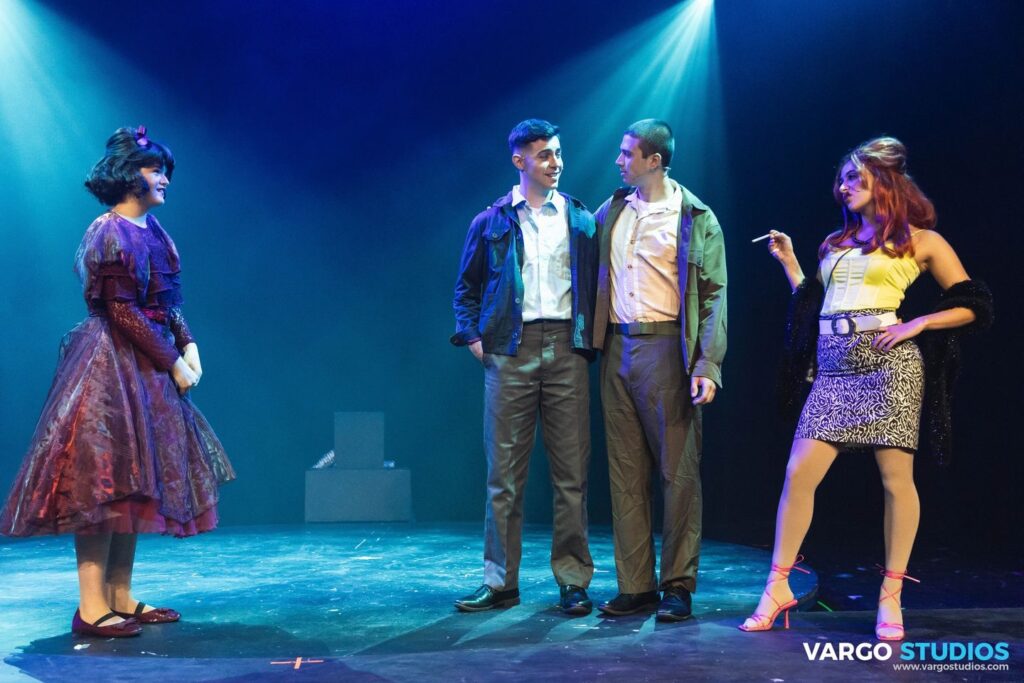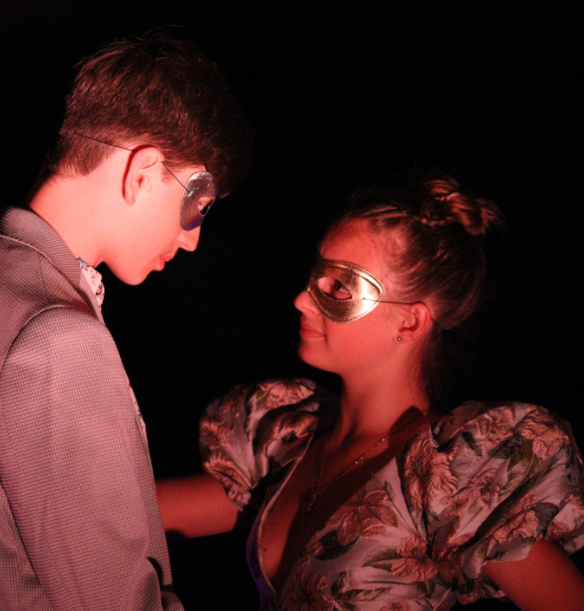
‘Dogfight’ // Spotlight Theatrical Company
‘Dogfight’ was powerful.
Some of the best musicals ever written have war as the backdrop. Perhaps that’s because nothing makes humans feel emotion more keenly than when the things we love are about to be ripped away. Director of Spotlight Theatre Company’s newest production ‘Dogfight’, Josh McCann-Thomson, was not afraid to lean into the intensity of that feeling. With a team of incredible creatives and cast, McCann-Thomson created a production which left audiences feeling the full breadth and depth of this incredible musical.
Set in the 1960s, ‘Dogfight’ is a story about a group of marines the day before they leave for the Vietnam War. It’s a tradition amongst the marines to go into the streets, find the ugliest girl they can, invite her to a party and be in the running to win a wad of cash and gloating rights. However, things don’t go quite right for Eddie Birdlace when his ‘ugly girl’ turns out to be anything but.
From the moment the curtains opened, the technical mastery of this production was on display. All elements melded together seamlessly, with snappy lighting cues and a design which firmly supported the narrative on stage. Stand out moments from Lighting Designer, Jamie Watt was the effective interaction of set and light particularly in the bathroom scene. Watt used the transparent mesh on the set walls to create a visually dynamic scene which pulled the audience into the downstage area. Set transitions were perfectly masked with zoned lighting which allowed the action to continue on stage while set was struck.
The technical design of the production truly shone during the war scene at the end of the production. A barren stage was transformed into a battle field through the skills of Watt and Sound Designer Marcus Du Toit. Lighting cues signalled gun fire and bursts of red represented soldiers falling. The soundscape design supported the lighting design and added urgency and terror to the scene unfolding on stage. The stylised and cohesive choices from the creative team in this moment demonstrated the impact of collaborative technical efforts.
Set Design McCann-Thomson and Michael Sutton fully served the action on stage and allowed transitions to occur seamlessly. This was achieved through a number of rolling flats which were spun and repositioned to transform the space for each scene. Intimate moments such as bedroom scenes saw the flats rolled centre stage and directional lighting used to isolate the space. Larger ensemble numbers were still framed by the flats however they were pushed to the extremities of the stage.
However, the set piece which made the audience gasp was the revolving stage. This centre platform further aided set transitions and created interesting and stylised blocking opportunities. ‘First Date, Last Night’ took place on the revolve as Rose and Eddie discover their fondness for each other. McCann-Thomson did a great job of playing with proximity as the pair’s affection grows throughout the number.
Costumes, wigs and makeup design by Millie Talbot and their team firmly rooted the narrative in the early 60s and brought larger than life costumes to the Spotlight stage. There was a lot of play amongst the ensemble costumes in the Dogfight scene and the caricature nature of the ‘ugly girls’ was thoroughly supported by their costumes. Super Swing, Chloe Smith’s downtrodden ‘ugly girl’ was hysterical and demonstrated the winning combination of costume, hair and makeup design and skilled comedic acting.
McCann-Thomson’s background in Contemporary Theatre shines in this production through his consistent stylistic choices and understanding of space. For a production with quite heavy subject matter, McCann-Thomson handled pacing with skill, ensuring that the action continued moving forward while allowing his actor’s space and permission to be still.
Any production is in safe hands when Julie Whiting holds the baton. A widely credited music director, conductor, vocal coach and educator, Whiting’s experience was a fantastic foundation for a show with a different music style than your classic musical. Vocally and instrumentally, composers Benj Pasek and Justin Paul are not afraid of empty space, complex rhythms and aggressive register changes and Whiting handled this challenge with great skill.
While not a dance-heavy show, choreography by Natalie Cassaniti was appropriate and brought great movement to the ensemble.
It’s always a treat as a reviewer to catch the understudy cast. So battling the peak hour traffic on a Thursday night was well worth it to watch Marcus Du Toit as Eddie Birdlace, Jess Ng as Rose Fenny, and Chloe Smith and Greyson Vaughn swinging into their new tracks.
Both the rolls of Rose and Eddie call for vocalists with a massive range and colour in their voice, physical and emotional chemistry and acting chops which can sell the story. Both Du Toit and Ng should be commended for an incredible effort in bringing their own versions of these characters to the stage.
Ng as Rose was wholly endearing and captivated audiences with her beautiful smile, truthful acting and gorgeous vocal tone. It was easy to quickly fall in love with the goodness of Rose and Ng brought incredible warmth to her portrayal. Ng could work on her mix to smooth out transitional notes between her chest and head voice however her tone and pitch accuracy was consistent throughout, delivering a well-rounded and powerful performance.
Du Toit as Eddie was the hero you loved to hate. Du Toit brought nuance to his character and showed Eddie’s emotional struggle of being stuck between the girl he liked and the boys he called his family. Du Toit gave an engaging and considered performance which was a joy to watch. Slowing down dialogue, planting on stage and keeping a grip on eye movement and eye line would help to further solidify Du Toit’s performance.
Swing Greyson Vaughn as Berstein was a standout performer in every sense. Bringing strong Marty Mcfly energy, Vaughn’s performance was energised, comedic and truthful. Jordan Lee as Bolad rounded out the three B’s and firmly solidified himself as an intimidating force. Lee captured Boland’s venom and gave a performance that was extremely vocally and physically strong.
Angelique Giuffre as Marcy was a brief but captivating character which made you feel like she was a part of the show for much longer than a handful of scenes. Giuffre embodied the crass archetype and transformed her physicality, voice and demeanour. The song ‘Dogfight’ between Marcy and Rose was an Act 1 standout.
Hunter Wall as Lounge Singer and…literally every other male presenting character, was another highlight. Wall’s ability to transform themselves from flamboyant performer, disgruntled waiter, masculine tattoo artist and many others was impressive and entertaining. Audience’s never knew where Wall would appear next.
It goes without saying that Spotlight’s Dogfight is a spectacular production. Big kudos to Spotlight for selecting a show which may not get immediate sell out crowds, but tells an authentic story with stunning music and truthful writing. Supported by a wildly talented cast and creative team, Spotlight’s ‘Dogfight’ is a production which imprints itself in audience’s hearts and minds long after the curtain falls.
‘Dogfight’ performs until Saturday 1 June 2024 at The Halpin Auditorium. For more information visit their website.






